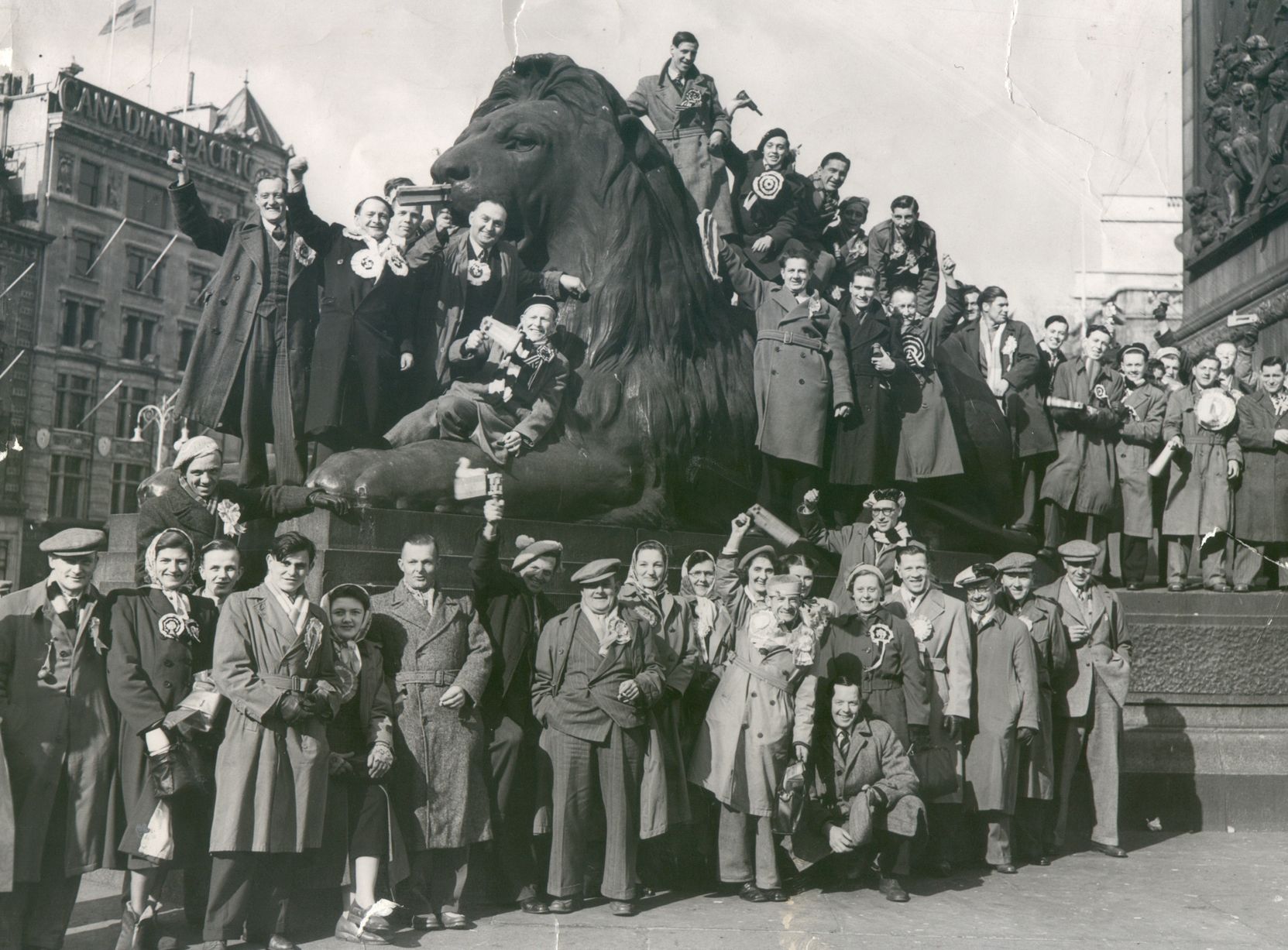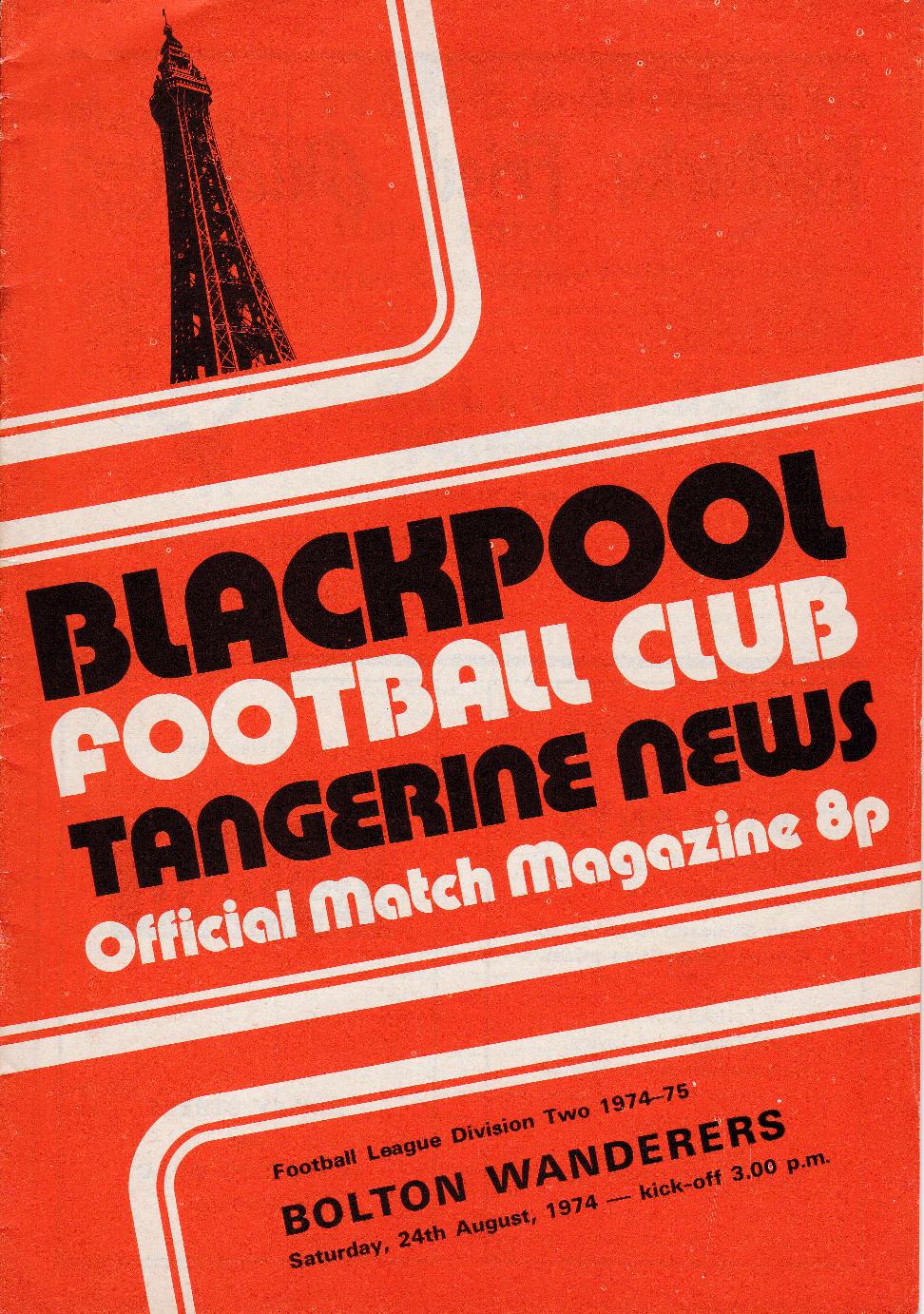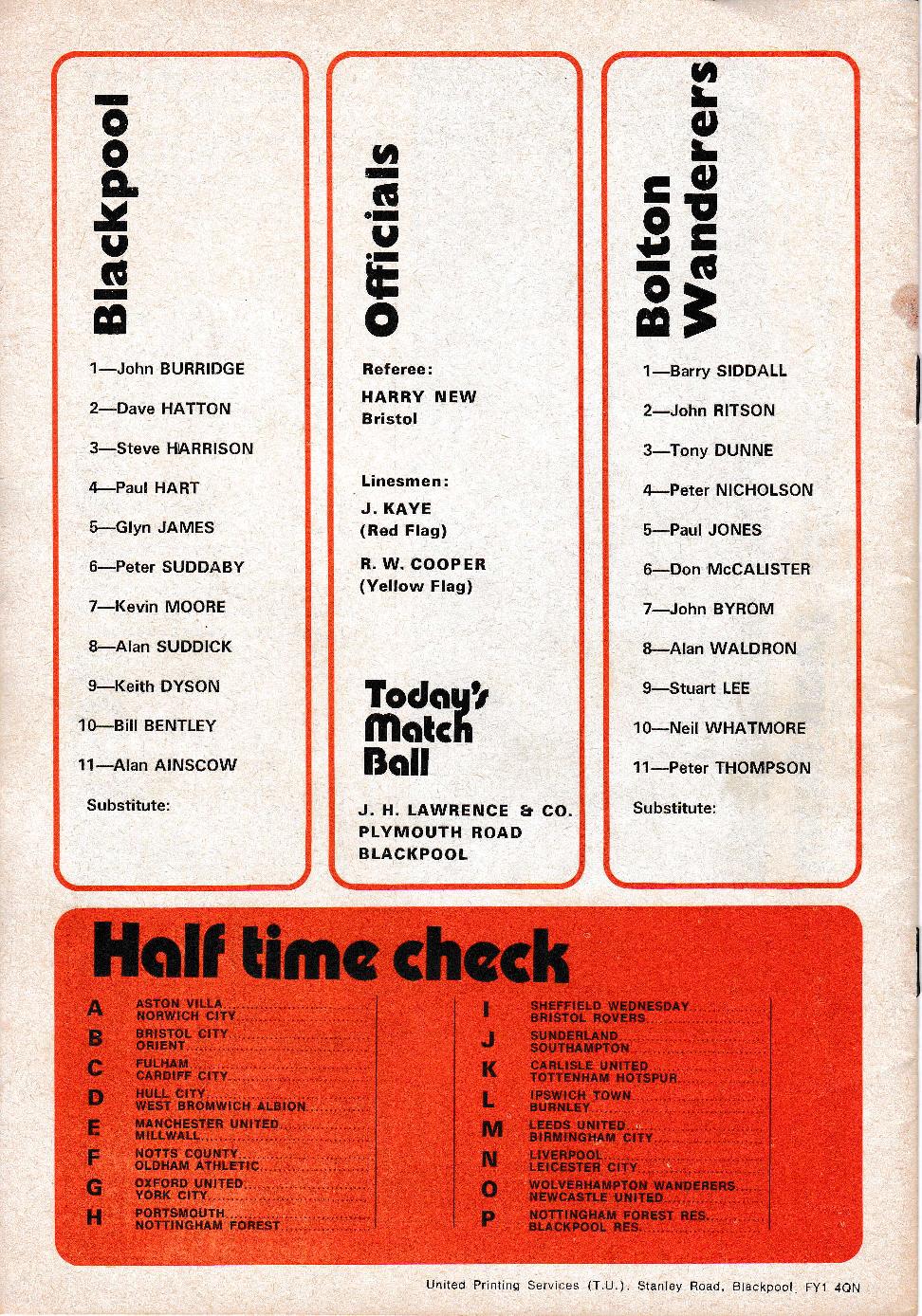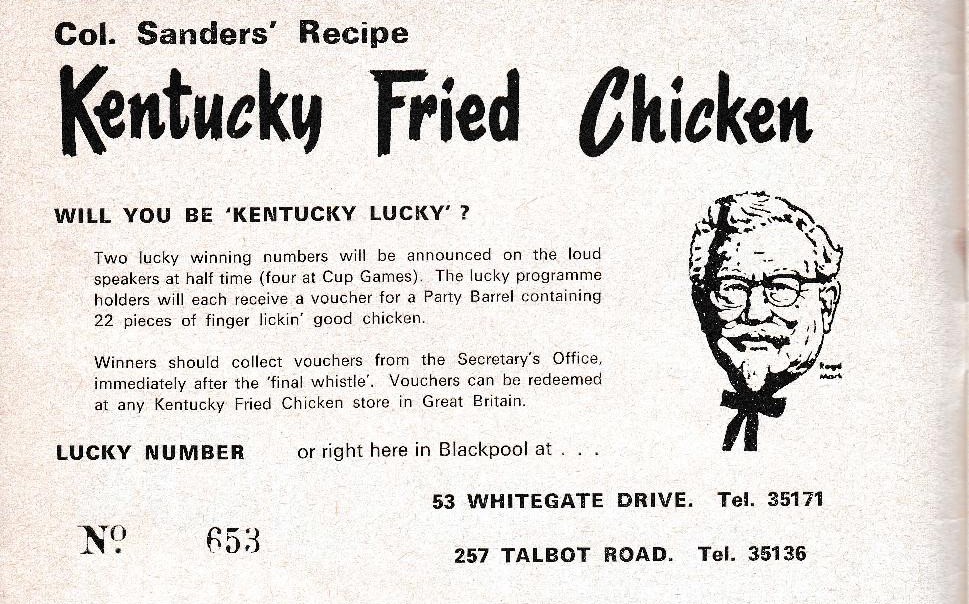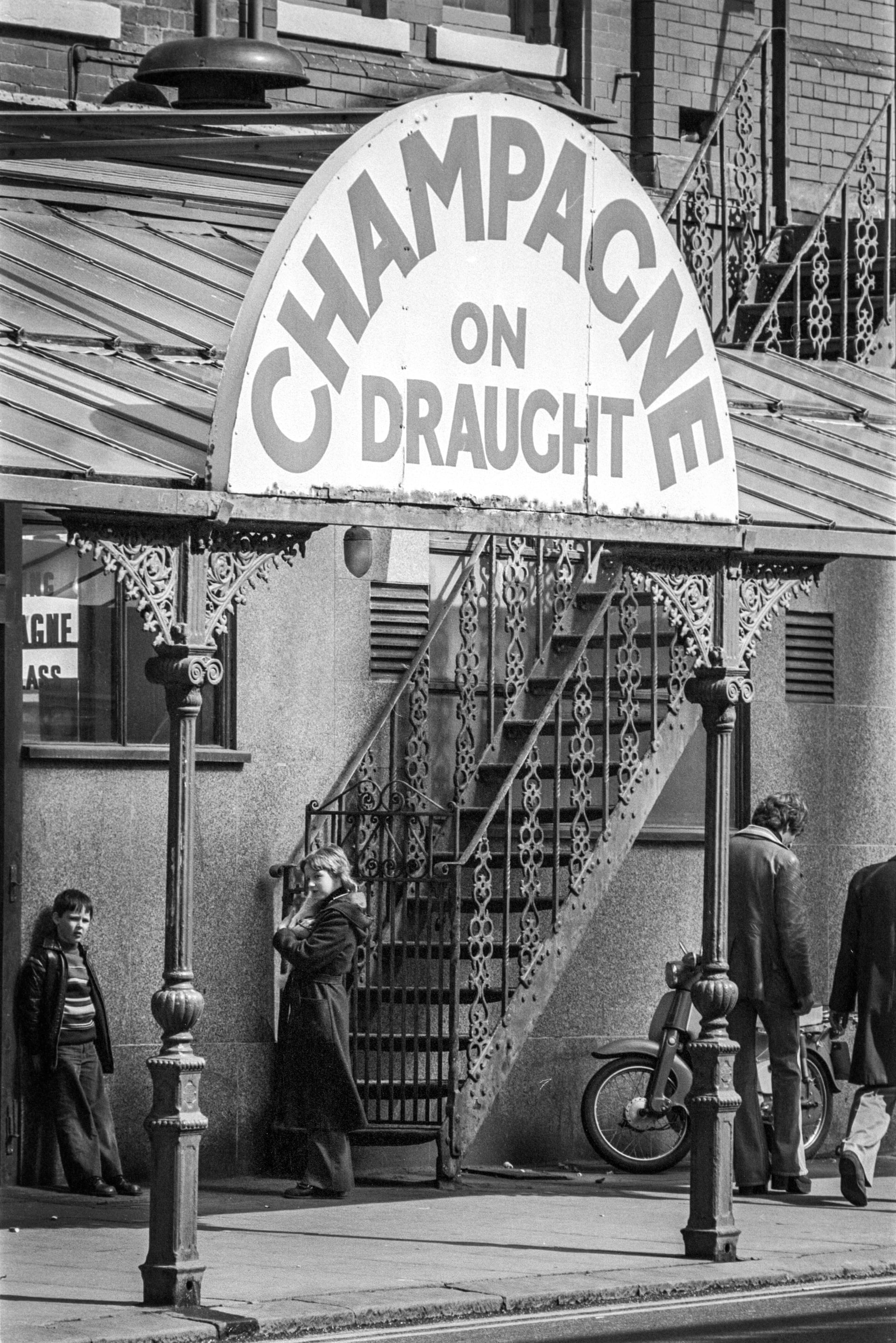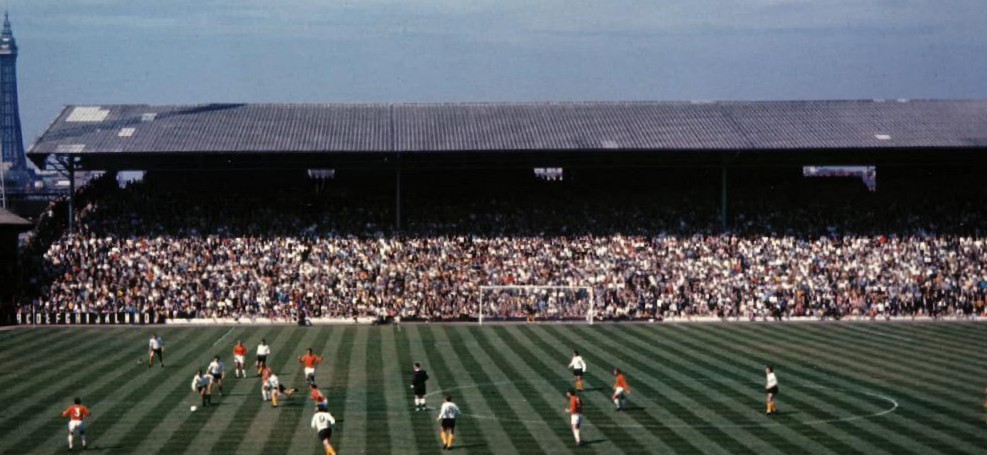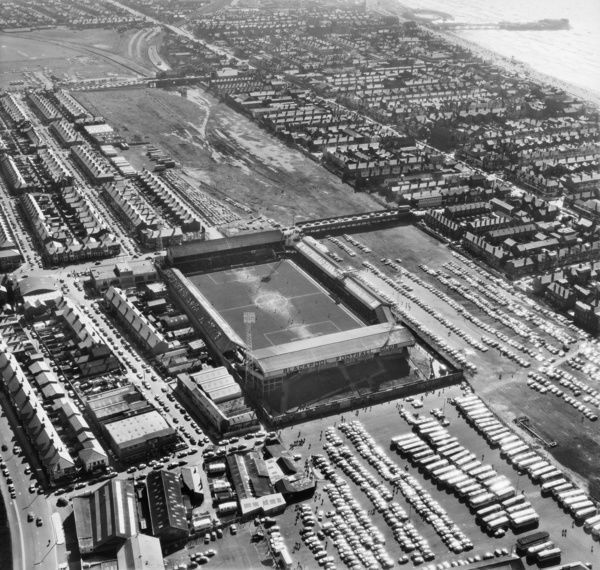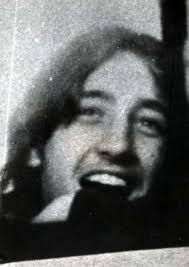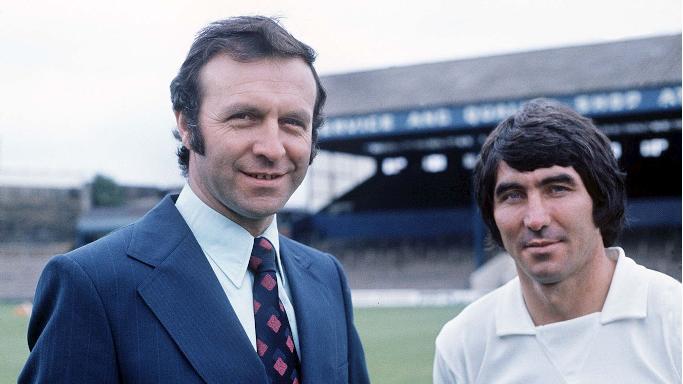The programme
This programme is from the Division 2 match between Blackpool and Bolton Wanderers on Saturday 24 August 1974. Blackpool won 2-1.
The game saw a Blackpool team who missed promotion by just 7 minutes in 1973-74 take on a Bolton side managed by former Tangerines favourite, Jimmy Armfield. ‘Pool had lost 2-1 at Norwich on the opening day, before drawing 0-0 with Leyton Orient at Bloomfield Road the previous Tuesday.
In what was – given the events of the afternoon – an unfortunate choice of words, home manager Harry Potts described Wanderers as “our friendly foe” and referenced the many previous “battles” between the two. Adverts of the day included Kentucky Fried Chicken and Whitbread Trophy Bitter – “the pint that thinks it’s a quart”.
The back story
In 1974, as today, an away game in Blackpool was party time for many a football fan. This was particularly true of teams from elsewhere in the North-West, for whom Wakes Weeks were still a very real memory and whose young men enthusiastically threw themselves into the resort’s many attractions. Not least of which, in those unsettled times, was the prospect of a decent punch-up with the tourist-resenting home support.
On this particular late-summer day there were thousands of Bolton fans in town. Many had been there since Friday evening, scuffling with all-comers in and around the traditional haunts of Yates’s (‘champagne on draught’) and the Manchester. Now they converged on Bloomfield Road, a substantial percentage of a 15,513 crowd. They were in all areas of the ground – South Stand, Paddock, Scratching Shed. But mostly they stood on the Kop.
Unusually, and unlike home ends at many grounds, the Bloomfield Road Kop was not necessarily seen as territory to be conquered and defended. Although there was no formal segregation, and while Blackpool supporters were jealously protective of it, a convention had developed that most away followers would gather on the right-hand side facing the pitch, hemmed in by home fans behind and in front. This did not make for a relaxing matchday experience. Fights during games were common, and a particular flashpoint was the half time break, when both sets of supporters mingled at the tea bars.
At Bloomfield Road the refreshment stalls were at street level, inside the turnstiles and at the foot of staircases leading up to the terraces. The terraces were roofed, but the banking at the rear was open to the elements and grassed between the staircases. Many fans avoided the tea bars because they knew the queues were a place where fights might break out. And so it proved today.
Accounts of events vary, but the facts are these. At half-time Kevin Olsson, a 17-year old ‘Pool fan, was stabbed near the tea bars. His wounds were so serious that, rather than wait for an ambulance, he was taken to hospital in a police car. He died.
Those who were there tell of rising anger through the second half as news filtered through to the crowd, with Bolton fans visibly frightened at the air of menace on the Kop – an anger that turned to outright, vengeful violence at the final whistle, while police locked the gates and took the name and address of every person before allowing them to go home. Of vicious attacks on those Bolton men foolish enough to stay in town for the Illuminations. Of police roadblocks on every route out of Blackpool, and massive tailbacks caused by checkpoints as far away as Lea Gate in Preston. Of relatives waiting anxiously for them as six, seven, and eight o’clock came and went. And of their horror and shame at what had happened.
In the days following the tragedy, Sports Minister Denis Howell – in the 70s a man often faced with unanswerable questions – went to Bloomfield Road. He talked of identity cards for football fans. But the last word goes to Jimmy Armfield. After the game he first visited Bolton midfielder Alan Waldron – who broke his leg during the match – and then travelled to the Olsson house. “I went from seeing Alan in hospital to calling on the family of the dead boy”, he said. “As a Blackpool man I felt I had to visit them.”
Looking forward
Neither team troubled the top or bottom of a league that was won by Manchester United, with Aston Villa second and Norwich third.
Armfield lasted 3 months at Burnden Park before Leeds poached him to replace Brian Clough. He was succeeded by Ian Greaves, previously his assistant, who had won the Division Two championship for Huddersfield in 1970 and who would also lift Bolton into the top flight.
Potts, a former title-winner with Burnley, survived for two more increasingly fraught seasons, eventually falling victim to Blackpool’s futile ambitions to regain the First Division place they had lost in 1971.
The police got their man – a minor – but the murder trial collapsed due to deficiencies in the prosecution’s case. On the Kop, a steel barrier appeared between “home” and “away” territories, and in general the events of August 24th are regarded as ushering in both fencing and formal segregation at League grounds.
Bad feeling persists to this day between Blackpool and Bolton fans of a certain age.
Normally I would have used an event which brings back so many memories as a “fans” feature, given that there are detailed recollections from many people on both Bolton and Blackpool messageboards. But I felt to do so would be wrong, given the anger and sadness that still surround Kevin Olsson’s death and the perceived miscarriage of justice that followed.
